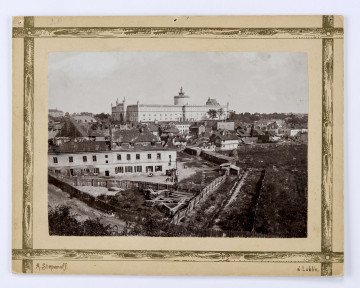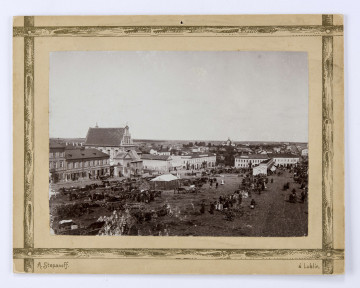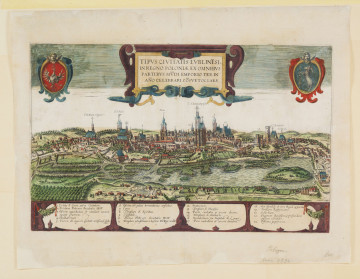
Lublin Castle
1880 — 1900
National Museum in Lublin
Part of the collection: Photographic iconography of Lublin from 1890–1939
Situated on a hill, the Lublin Castle was erected in the Middle Ages. Only the oldest brick defence tower, called a donjon, and the Chapel of the Holy Trinity, with Byzantine frescoes inside, have remained from the old buildings. In the early 19th century, the ruins of the castle were converted into a prison.
During the reign of Kazimierz the Great, in the second half of the 15th century, Jews settled at the foot of the castle, in the vicinity of the town surrounded by a fortified wall. Their quarter grew and experienced a period of splendour with the flourishing of Lublin during the Renaissance. With time, it began to decline. Most of the wealthier residents left the area. In the interwar period, only small traders, porters and craftsmen remained near the prison buildings. They lived in small tenement houses along Lubartowska, Szeroka and Cyruliczna Streets. The closer to the Castle Hill, the poorer the buildings; most of them were wooden and lacked sewage systems.
In an aerial photograph taken in the 1930s, in the dense built-up area of the Jewish quarter, one can distinguish sacred buildings which no longer exist but which are witnesses of better times – the House of Prayer on Krawiecka Street and the Great Synagogue (Maharshal Synagogue) at Jateczna Street, obscured by a prison. In the distance one can see the Jewish market in Ruska Street and the Orthodox Church of the Transfiguration of Christ, built in the first half of the 17th century and preserved to this day. Its presence in the neighbourhood of the former Catholic and Jewish temples testifies to the multi-faith character of the city.
Above the tangle of streets and larger or smaller buildings, the picture shows a vast prison complex with an administrative building in front of the entrance gate, demolished only in the 1950s, when after World War II the image of Lublin – a city that survived the extermination of many of its inhabitants – was changing.
Author / creator
Dimensions
cały obiekt: height: 24 cm, width: 18 cm
Object type
photography
Technique
photographic print
Material
paper, cardboard
Creation time / dating
Creation / finding place
Owner
The National Museum in Lublin
Identification number
Location / status

1880 — 1900
National Museum in Lublin

1880 — 1900
National Museum in Lublin

1618
National Museum in Lublin
DISCOVER this TOPIC
National Museum in Szczecin
DISCOVER this PATH
Educational path